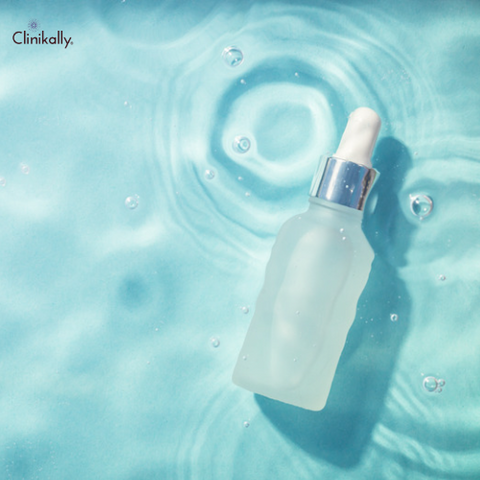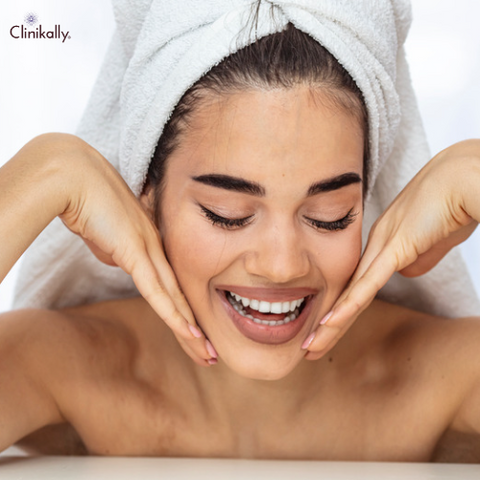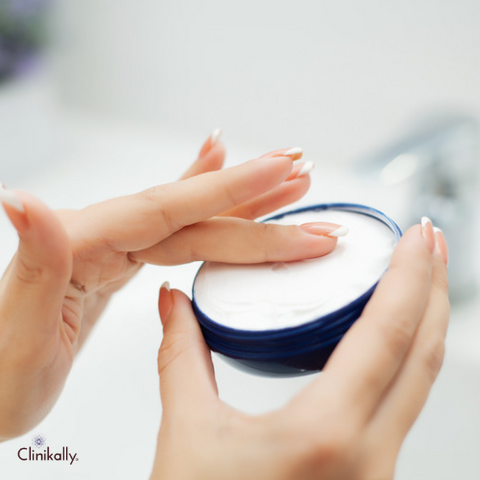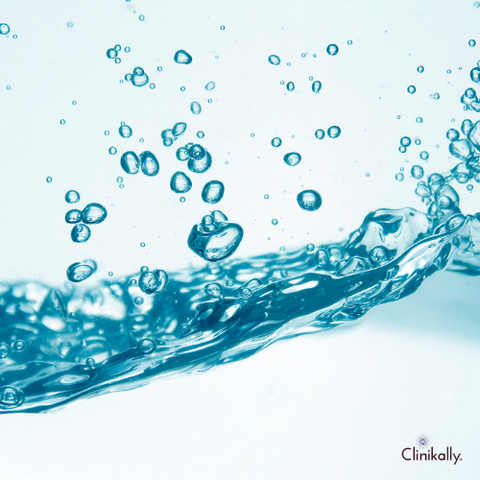Purified or deionized water is often used in natural skin care products due to its purity and lack of impurities that can potentially harm the skin. Unlike tap water, which can contain minerals, chemicals, and other contaminants, purified or deionized water is treated to remove impurities and ensure that it is safe for use on the skin.
In natural skin care, purified or deionized water is often used as a base for many products, such as toners, facial mists, and moisturizers. Using purified water as a base helps to ensure that the other ingredients in the product are able to penetrate the skin effectively and deliver their intended benefits.
Additionally, using purified or deionized water in natural skin care products can help to prevent irritation and allergic reactions that can be caused by impurities and contaminants found in tap water. This is especially important for those with sensitive skin.
Overall, the use of purified or deionized water in natural skin care products helps to ensure that the products are safe and effective for use on the skin, and can help to promote healthy, radiant skin.
The Importance of Water in Skin Care Products

Water is a critical component of skin care products for several reasons:
-
Hydration: Water is essential for keeping the skin hydrated and preventing dryness and flakiness. When the skin is dehydrated, it can become dull, itchy, and more prone to developing fine lines and wrinkles.
-
Product efficacy: Water helps to ensure that the other ingredients in a skin care product can penetrate the skin and deliver their intended benefits. Without water, the product may not be as effective.
-
Texture: Water helps to give skin care products their texture and consistency. Without water, products may be too thick or difficult to apply to the skin.
-
Cooling effect: Water can have a cooling effect on the skin, which can be soothing and refreshing. This is especially important for products such as toners and facial mists.
-
Cleansing: Water is also essential for cleansing the skin. Cleansers and other products that contain water help to remove dirt, oil, and impurities from the skin and leave it feeling clean and refreshed.
When it comes to selecting skin care products, it is important to look for products that contain water as one of the main ingredients. However, it is also important to choose products that use purified or deionized water to ensure that the water is free of impurities that can potentially harm the skin.
The Differences Between Tap Water and Purified Water
There are several key differences between tap water and purified water:
-
Impurities: Tap water often contains impurities such as minerals, chemicals, and microorganisms. These impurities can vary depending on the source of the water and the treatment process used to make it safe for consumption. Purified water, on the other hand, is treated to remove impurities and ensure that it is safe for consumption and use in products such as skin care.
-
Taste and odor: Tap water can have a distinct taste and odor due to the presence of impurities. Purified water typically has a neutral taste and odor, as the impurities that can cause taste and odor are removed during the purification process.
-
Mineral content: Tap water often contains minerals such as calcium and magnesium, which can be beneficial for overall health. However, excessive mineral content in water can leave mineral deposits on skin and hair, making it look dull and dry. Purified water, on the other hand, has a low mineral content, which can be better for skin and hair health.
-
pH level: Tap water can have a varying pH level, depending on the source and treatment process. Purified water typically has a neutral pH level, which is closer to the pH level of skin, making it more gentle and less likely to cause irritation.
Overall, purified water is a better option for use in skin care products, as it is free of impurities and has a neutral pH level, making it gentler on the skin. However, tap water can be safe to use as well, depending on the source and treatment process used in your area.
The Benefits of Purified or Deionized Water in Skin Care Products
Purified or deionized water is commonly used in skin care products for several reasons:
-
Purity: Purified or deionized water is treated to remove impurities and contaminants that may be present in tap water. This makes it safe for use on the skin and reduces the risk of irritation or allergic reactions.
-
Better Absorption: Because purified or deionized water has fewer impurities, it can be absorbed more easily by the skin. This allows other active ingredients in the product to penetrate the skin more effectively, increasing the product's overall efficacy.
-
pH Balance: Purified or deionized water has a neutral pH level, which is similar to the pH level of the skin. This helps to maintain the skin's natural pH balance and reduce the risk of irritation.
-
Consistency: Purified or deionized water helps to create a consistent texture and viscosity in skin care products. This helps to ensure that the product is easy to apply and spreads evenly on the skin.
-
Longevity: Purified or deionized water can help to extend the shelf life of skin care products, as it is less likely to contain contaminants that can cause spoilage.
Overall, purified or deionized water is an important ingredient in many skin care products. It helps to ensure that the product is safe and effective, and provides a number of benefits for the skin, including better absorption, pH balance, consistency, and longevity.
Understanding Water-Based Skin Care Formulations

Water-based skin care formulations are products that use water as the primary ingredient. These types of formulations are typically used in products such as toners, mists, serums, and moisturizers.
Water-based formulations can provide a number of benefits for the skin. One of the most important benefits is hydration. Water-based formulations help to replenish moisture in the skin, which can be lost due to environmental factors, aging, or other factors. This can help to improve skin texture, reduce the appearance of fine lines and wrinkles, and give the skin a more youthful and radiant appearance.
In addition to hydration, water-based formulations can also help to improve the absorption and efficacy of other active ingredients in the product. Water-based formulations help to penetrate the skin more easily, allowing other ingredients to be absorbed more effectively. This can enhance the overall effectiveness of the product and provide more noticeable results.
Water-based formulations can also be formulated to be lightweight and non-greasy, making them ideal for use in products such as serums and moisturizers. These types of products are often preferred by individuals with oily or combination skin, as they can help to reduce the appearance of oiliness and shine.
Overall, water-based skin care formulations are an important part of any skin care routine. They provide hydration, improve absorption, and can be formulated to be lightweight and non-greasy, making them ideal for use in a variety of skin care products.
The Role of Water in Emulsions and Suspensions
Water plays a critical role in emulsions and suspensions in skin care products. An emulsion is a mixture of two immiscible liquids, such as oil and water, that are combined to form a stable and homogeneous product. A suspension, on the other hand, is a mixture of solid particles in a liquid, where the particles are suspended throughout the liquid.
In both emulsions and suspensions, water serves as the primary liquid component. In emulsions, water is used to create a stable mixture of oil and water by emulsifying the two liquids together. Water acts as the continuous phase, or the medium in which the oil is dispersed. Emulsions require an emulsifying agent, which helps to stabilize the mixture and prevent the oil and water from separating.
In suspensions, water is used to suspend solid particles throughout the liquid. The solid particles are dispersed throughout the water, creating a uniform mixture. This allows the solid particles to be evenly distributed throughout the product and prevents settling.
Water also provides a number of benefits in emulsions and suspensions. Water-based products tend to have a lighter, more comfortable feel on the skin, making them ideal for use in products such as lotions and creams. Water-based products also tend to be more easily absorbed into the skin, which can enhance their effectiveness.
Overall, water plays a critical role in the formulation of emulsions and suspensions in skin care products. It helps to create stable mixtures of oil and water and allows solid particles to be evenly dispersed throughout the product. Water also provides a number of benefits for the skin, including hydration and improved absorption.
How Water Affects Skin Care Product Texture and Consistency
Water is an important ingredient in skin care products, and it can have a significant impact on the texture and consistency of the final product. Here are some ways in which water affects skin care product texture and consistency:
-
Viscosity: The amount of water in a skin care product can affect its viscosity, or thickness. Water-based products tend to be thinner and more fluid, while products with less water tend to be thicker and more viscous. The addition of water can help to create a lighter, more spreadable product, while reducing the amount of water can create a thicker, more concentrated product.
-
Absorption: The amount and type of water in a skin care product can affect its absorption into the skin. Water-based products tend to be more easily absorbed into the skin, while products with less water may sit on top of the skin for longer before being absorbed.
-
Consistency: The amount of water in a skin care product can also affect its consistency. For example, adding more water to a cream can make it thinner and easier to apply, while reducing the amount of water can make it thicker and more concentrated.
-
Texture: Water can also affect the texture of a skin care product. For example, products that contain more water may feel more lightweight and refreshing on the skin, while products with less water may feel richer and more emollient.
Overall, water is an important ingredient in skin care products, and it can have a significant impact on the texture and consistency of the final product. By adjusting the amount and type of water in a formulation, manufacturers can create products with a range of different textures and consistencies to meet the needs of different skin types and preferences.
The Risks of Contaminated Water in Skin Care Products

Contaminated water can pose a significant risk in skin care products. Water is a common ingredient in many skin care products, and it can be a breeding ground for bacteria and other microorganisms. If the water used in a skin care product is contaminated, it can lead to infections, irritation, and other adverse effects on the skin.
Contaminated water can contain a range of harmful substances, including bacteria, viruses, fungi, and parasites. These microorganisms can cause a range of skin infections, such as acne, folliculitis, and cellulitis. They can also lead to more serious infections, such as sepsis, if they enter the bloodstream.
In addition to microorganisms, contaminated water can also contain harmful chemicals, such as heavy metals and pesticides. These substances can be absorbed into the skin and cause a range of adverse effects, such as skin irritation, allergic reactions, and even cancer.
To avoid the risks of contaminated water in skin care products, it's important to use products that are formulated with purified or deionized water. These types of water have been treated to remove impurities and contaminants, reducing the risk of bacterial growth and other adverse effects.
In addition to using purified water in skin care products, it's also important to follow proper manufacturing and storage procedures to prevent contamination. Manufacturers should use clean equipment and facilities, and products should be stored in a cool, dry place to prevent the growth of microorganisms.
Overall, the risks of contaminated water in skin care products highlight the importance of using high-quality, purified water and following proper manufacturing and storage procedures to ensure the safety and efficacy of skin care products.
The Impact of Contaminated Water on Skin Health
Contaminated water can have a negative impact on skin health, as it can contain harmful substances that can irritate or damage the skin. Here are some ways that contaminated water can affect skin health:
-
Skin irritation: Contaminated water can contain substances that can irritate the skin, such as chlorine, heavy metals, and pesticides. These substances can cause redness, itching, and other forms of irritation on the skin.
-
Infections: Contaminated water can be a breeding ground for bacteria, viruses, and other microorganisms that can cause skin infections. These infections can range from mild, such as folliculitis or impetigo, to more serious, such as cellulitis or sepsis.
-
Acne: Contaminated water can contain bacteria that can contribute to the development of acne. The bacteria can clog pores and lead to inflammation, resulting in the formation of pimples and other blemishes.
-
Allergic reactions: Contaminated water can contain substances that can trigger allergic reactions in some people. These reactions can range from mild, such as redness and itching, to more severe, such as hives or anaphylaxis.
-
Skin cancer: Contaminated water can contain chemicals that have been linked to an increased risk of skin cancer. For example, some water sources contain high levels of arsenic, which has been associated with an increased risk of skin cancer.
Overall, contaminated water can have a range of negative effects on skin health, and it's important to take steps to protect your skin from exposure to contaminated water. This includes using purified or deionized water in skin care products, avoiding swimming or bathing in contaminated water sources, and following proper hygiene and sanitation practices to reduce the risk of bacterial growth and other forms of contamination.
Regulatory Standards for Water Purity in Skin Care Products
The regulatory standards for water purity in skin care products vary depending on the country and region. In the United States, the Food and Drug Administration (FDA) regulates cosmetics, including skin care products, and requires that cosmetics be safe for use and properly labeled.
While the FDA does not have specific regulations for water purity in cosmetics, it does require that all cosmetics be free of harmful contaminants and meet certain quality standards. In addition, the FDA encourages cosmetic manufacturers to follow good manufacturing practices, which include using high-quality, pure water in their products.
In the European Union, the European Pharmacopoeia (EP) sets standards for water quality in pharmaceuticals and cosmetics. The EP specifies that purified water and highly purified water must meet certain chemical and microbiological purity criteria, and must be produced using validated processes.
In Japan, the Ministry of Health, Labour and Welfare (MHLW) sets standards for water quality in cosmetics. The MHLW specifies that water used in cosmetics must be free of harmful substances and meet certain microbiological purity criteria.
Overall, while there are no specific regulatory standards for water purity in skin care products, manufacturers are expected to ensure that their products are safe and meet certain quality standards. Using high-quality, purified water is an important step in ensuring the safety and efficacy of skin care products.
Choosing High-Quality Water in Natural Skin Care

Choosing high-quality water is important in natural skin care because it can help ensure the safety and effectiveness of the products. Here are some tips for choosing high-quality water in natural skin care:
-
Look for purified or deionized water: Purified or deionized water is free of minerals and other impurities, making it a good choice for natural skin care products.
-
Check the source of the water: If the water used in natural skin care products is sourced from a natural spring or other natural source, make sure that the source is clean and free of contaminants.
-
Check the treatment process: If the water is treated before being used in skin care products, make sure that the treatment process is effective in removing impurities and contaminants.
-
Check for certifications: Look for skin care products that have been certified by independent organizations, such as NSF International or the Water Quality Association, which can provide assurance that the products meet certain quality standards.
-
Consider the environmental impact: Choose skin care products that use water in an environmentally responsible way, such as by using recycled or sustainable water sources.
Overall, choosing high-quality water is an important part of natural skin care, as it can help ensure the safety and effectiveness of the products. By following these tips, you can make informed decisions when choosing natural skin care products that use high-quality water.
The Advantages of Purified or Deionized Water in Natural Skin Care
Using purified or deionized water in natural skin care can offer several advantages:
-
Consistency: Purified or deionized water is free of impurities that can affect the consistency of skin care products, which can result in more consistent and reliable products.
-
Purity: Purified or deionized water is free of minerals and other impurities that can affect the safety and effectiveness of skin care products. This can help reduce the risk of skin irritation or allergic reactions.
-
Shelf life: Purified or deionized water can help extend the shelf life of natural skin care products by reducing the growth of bacteria and other microorganisms that can cause spoilage.
-
Better absorption: Purified or deionized water can improve the absorption of skin care products by reducing the presence of minerals that can interfere with the absorption of active ingredients.
-
Effectiveness: The use of high-quality water can help ensure the effectiveness of natural skin care products, as it can help ensure that the active ingredients are delivered to the skin in a consistent and effective manner.
Overall, the use of purified or deionized water in natural skin care can help ensure the safety, consistency, and effectiveness of skin care products.
Tips for Identifying High-Quality Water in Skin Care Products
Here are some tips for identifying high-quality water in skin care products:
-
Check the ingredient list: Water is often listed as the first ingredient in skin care products, so it's important to look for terms like purified water, deionized water, or distilled water. If the ingredient list simply says "water," it's harder to know if the water used is of high quality.
-
Check for certifications: Look for skin care products that have been certified by independent organizations such as NSF International or the Water Quality Association. These certifications can provide assurance that the products meet certain quality standards for water purity.
-
Look for transparency from the brand: A reputable skin care brand should be transparent about the water sources and treatment processes used in their products. Look for brands that provide detailed information about the water sources and treatment methods they use.
-
Check for testing results: Some skin care brands may perform testing on their water sources to ensure purity and safety. Look for products that provide testing results or other evidence of quality assurance.
-
Research the brand: Do some research on the brand and its reputation in the industry. Look for reviews and feedback from other customers and industry professionals to get a sense of the brand's commitment to quality and safety.
By following these tips, you can identify skin care products that use high-quality water and feel confident in the safety and effectiveness of the products.
Why Water Source Matters in Natural Skin Care Products.
The water source used in natural skin care products can have a significant impact on the safety, effectiveness, and overall quality of the product. Here are some reasons why water source matters:
-
Impurities: The quality of the water used can impact the quality of the final product. Tap water, for example, can contain impurities such as minerals, chlorine, and heavy metals that can negatively impact the effectiveness of active ingredients in skin care products.
-
Contaminants: Water sources can also be contaminated with harmful substances such as bacteria, viruses, and chemicals. Using contaminated water in skin care products can increase the risk of skin irritation, infections, or allergic reactions.
-
pH level: The pH level of the water source can impact the pH level of the final product. The pH level of the skin care product is important because it can affect how it interacts with the skin.
-
Sustainability: The source of the water used in natural skin care products can also impact sustainability. Brands that prioritize sustainability may use water sources that are renewable and/or locally sourced.
Overall, the water source used in natural skin care products can have a significant impact on the quality and safety of the final product. By using high-quality water sources such as purified or deionized water, natural skin care brands can ensure that their products are effective, safe, and sustainable.
































